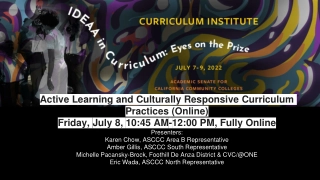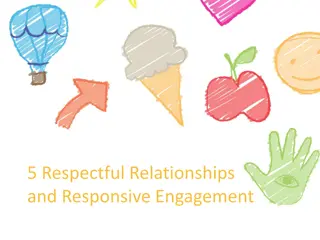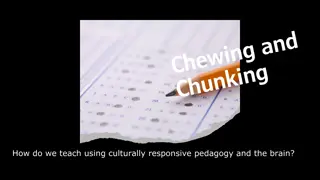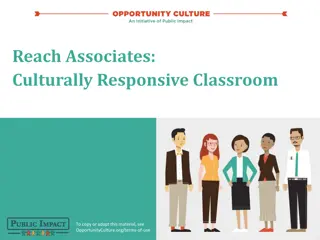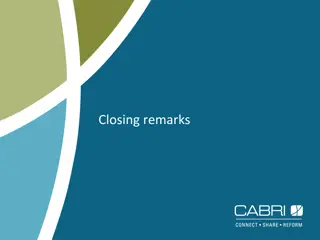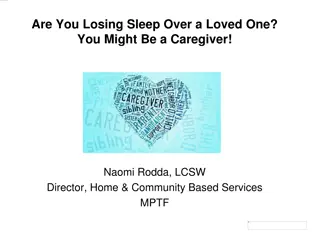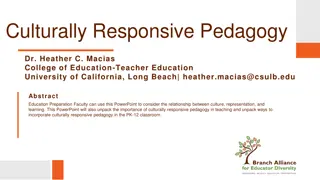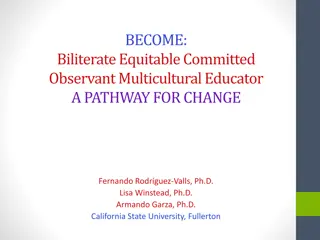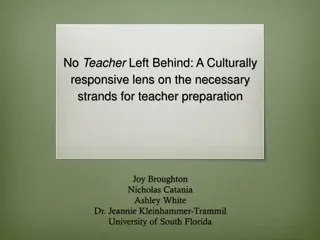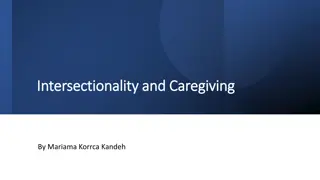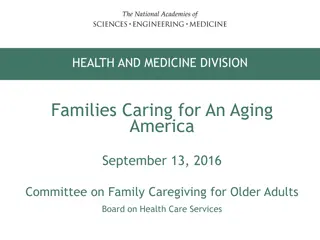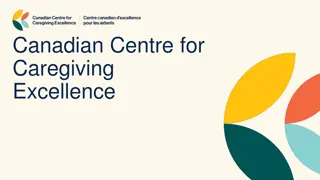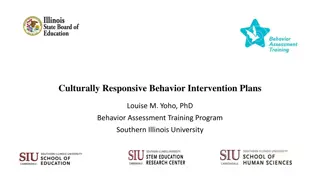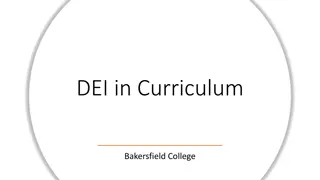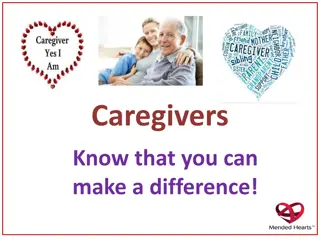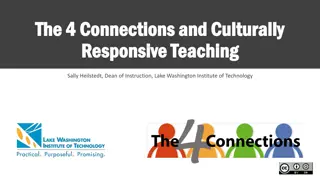Culturally Responsive Caregiving and Building Positive Relationships with Families
Explore the importance of culturally responsive caregiving and building positive relationships with families in the context of child care. Learn about values, skills, and behaviors essential for effective communication and collaboration with parents. Reflect on the challenges and rewards of working with infants and toddlers. Gain insights on defining values and becoming culturally sensitive in caregiving practices.
Download Presentation

Please find below an Image/Link to download the presentation.
The content on the website is provided AS IS for your information and personal use only. It may not be sold, licensed, or shared on other websites without obtaining consent from the author.If you encounter any issues during the download, it is possible that the publisher has removed the file from their server.
You are allowed to download the files provided on this website for personal or commercial use, subject to the condition that they are used lawfully. All files are the property of their respective owners.
The content on the website is provided AS IS for your information and personal use only. It may not be sold, licensed, or shared on other websites without obtaining consent from the author.
E N D
Presentation Transcript
+ California Child Care Resource & Referral Network Annual Conference October 26, 2012 Domenica M. Benitez domenica@rrnetwork.org Building Positive Relationships with Families
+Building Positive Relationships with Families: Becoming Culturally Responsive Parent Relationships Values Keys to Culturally Sensitive Care Skills Needed to Become Culturally Responsive to Families Individual Differences Communication with Families to Resolve Issues: Ask, Acknowledge, Adapt
+Parent Relationships: Reflection What is important to you in caring, meaningful relationships? What makes them caring and meaningful? A. Why is the relationship between parent and caregiver so important? B. As an R&R Counselor, Trainer, or Caregiver, what do you want from parents? C. As a parent, what do/would you want from a R&R Counselor, Trainer, or Caregiver? D. In your experience, what are the most challenging aspects of working with parents of infants and toddlers? E.
+Value Value describes the worthiness of an action or belief; a principle, standard or quality considered worthwhile by the possessor. Values Describe the beliefs/actions that we feel are desirable Represent the intrinsic worth we assign to actions or beliefs that we deem important
+Defining Values One s are Parents Two s are FCC Providers Take 5 minutes to think about and then write down your ideas to the following questions: 1. As a Parent or FCC Provider, write down the values that you feel are essential in care giving with infants. 2. Once you have defined these values, try to describe a behavior (way of acting) for each one that best demonstrates this value. Be as specific as you can be describing how someone with this value behaves in specific situations.
+Skills Needed to Become Culturally Responsive to Families Being able to name your experiences Uncover your cultural beliefs: Culture starts with you; be aware of your own values, beliefs, and biases and how they impact others 1. Listening and being willing to learn from others Be open to the perspective of others: Acknowledge that your view is only one of many, not the view that must be accepted; be open to other s ways of seeing things based on their experiences. Be aware of your discomforts when conflicts arise. 2. Gathering information Seek out cultural and family information: Get information about other s views, beliefs, and values. Listen openly to other s experiences and views; ask questions to understand. 3. Communicating and creating dialogue Clarify values: Be willing to risk talking about differences with others; understanding can only come through dialogue. Maintain focus on the key issues and how they impact the child and family. 4. Collaborating and negotiating Negotiate cultural conflicts: See negotiations as a process that respects both perspectives; solutions must include the needs of both parties. Commit to work together collaborate. Continue to dialogue together even when you don t agree. 5.
+Individual Differences Families vary tremendously in how closely they follow cultural rules. Variation in families childrearing practices may be amplified when the mother and father belong to different cultural groups. In light of differences between families, the best source of information about a particular family s preferences and childrearing style is THAT particular family.
+Individual Differences: Reflection When you were a child, how did you/your family eat meals? Who prepared the food? How was the food served and who served it? What type of food was served? Was there as much food as you wanted? Did you have to clean your plate? Were children allowed to talk at the table? At what age did you feed yourself?
+Acknowledge, Ask, Adapt Acknowledge: Reflect and Listen Communicate Awareness of the issue Convey sincere interest and responsiveness Involve family in seeking a joint solution Ask: Learn about the Parent s Point of View Gather data; clarify Pay attention to verbal and nonverbal responses Restate what you think the parent is saying Adapt: Work with Family Toward a Solution Listen for areas of common agreement Negotiate around important issues Seek win-win solutions
+Acknowledge, Ask, and Adapt: Process in Communicating Step 1: Acknowledge Take time to think about how you feel about the issue and get clarity on the reasons behind your feelings Step 2: Ask Gather data; try to get to the real sources for the conflict or misunderstanding for the parent, the child, or you. Ask questions that seek to clarify. Step 3: Adapt Once the issues have been defined, seek out the common ground by stating your areas of greatest importance to each other. Listen carefully for areas of common agreement. Listen carefully to the other person s concern. If you bring up the concern, do it respectfully with an attitude of wanting to understand the issue. Pay attention to verbal and nonverbal responses. Restate what you think is being said; take time to be sure you mean the same thing in the language you are using. Negotiate around the areas of important agreements and boundaries. Come to a resolution that addresses the real/major issues. Sometimes we have to agree to disagree.
+ Acknowledge, Ask, and Adapt: Process in Communicating (cont.) Acknowledge How does the caregiver/counselor recognize the need for communication with the parent? How does the caregiver/counselor s attitude convey sincere interest and response? What can the caregiver/counselor say to the parent to communicate an awareness that there is a problem they need to jointly solve? Ask What questions can the caregiver/counselor ask the parents to get information that will help her/him understand more precisely the parents point of view? Adapt How does the caregiver/counselor work with the parent to define the issues and boundaries of the problem? Does the caregiver/counselor seek common ground as the basis for negotiation? Does the caregiver/counselor open up a negotiation with the parent about what to do?
+Resources Many of the activities and materials have been adapted by Domenica M. Benitez from Module IV, Culture, Family, and Providers, WestEd, The Program for Infant/Toddler Caregivers. This document may be reproduced for educational purposes. Thank you for your active participation in this training! This PowerPoint Presentation will be posted on the California Child Care Resource & Referral Network s CCIP Page. For additional support or information, contact Domenica M. Benitez at domenica@rrnetwork.org.


